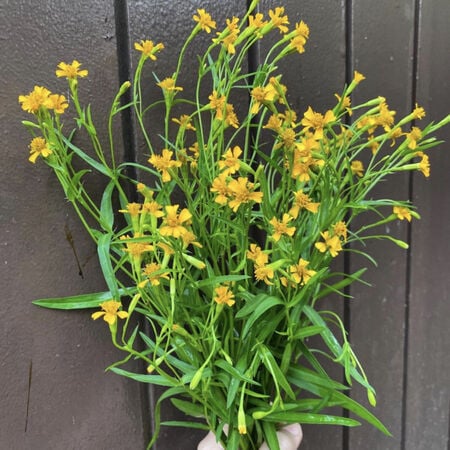Mexican, Tarragon Seed
Key Attributes
Key Attributes
Product Details
Weight
0.008Depth
0.1Height
4.5Width
3.25Botanical Name
Tagetes lucidaSeed Type
SeedSeeds Per Gram
1,300Packet
100 seedsSow Depth
1/4"Seeds Per Ounce
36,400Breed
Open-pollinatedLife Cycle
AnnualSow Method
TransplantCategories
HerbDays To Maturity (# Days)
85Components
Growing Instructions
![]() Learning Download: How to Grow Tarragon
Learning Download: How to Grow Tarragon
Tarragon is a hardy herb usually grown for its leaves and their aromatic flavor. Tarragon plants can reach up to 3 feet tall. The herb has long, light green leaves and yellow or white flowers.
Before Planting: Tarragon grows best in full sun in soil with a pH of 6.5 to 7.5. Because of its great root system, tarragon can thrive in poorer soils.
Planting: Begin tarragon seeds indoors in April and sow four to six seeds per pot in moist, composted potting soil. Once seedlings sprout a few inches, thin them to one seedling per pot. Transplant tarragon seedlings outdoors once the last frost has passed. Upon transplanting them outside, space tarragon plants 18 to 24 inches apart if planting in the garden.
Watering: Tarragon does not require frequent watering unless there is a drought.
Fertilizer: Prior to planting tarragon outdoors or transplanting it, mix 1 to 2 inches of compost into the top 6 inches of soil and add ½ tablespoon of an all-purpose fertilizer per square foot. After planting, there is no need to fertilize as tarragon’s flavor will intensify in low-nutrient soil.
Days to Maturity: Both the leaves and the flowers of tarragon can be harvested and are usually ready for harvest in the late summer. (See variety for days to maturity)
Harvesting: Harvest tarragon in the morning and do so by stripping the lower leaves from the stem first.
Tips: Divide the tarragon plants every three to five years to ensure its best growth.
Shipping Schedule
Our Seed Promise
 "Agriculture and seeds" provide the basis upon which our lives depend. We must protect this foundation as a safe and genetically stable source for future generations. For the benefit of all farmers, gardeners and consumers who want an alternative, we pledge that we do not knowingly buy or sell genetically engineered seeds or plants.
"Agriculture and seeds" provide the basis upon which our lives depend. We must protect this foundation as a safe and genetically stable source for future generations. For the benefit of all farmers, gardeners and consumers who want an alternative, we pledge that we do not knowingly buy or sell genetically engineered seeds or plants.
The mechanical transfer of genetic material outside of natural reproductive methods and between genera, families or kingdoms, poses great biological risks as well as economic, political, and cultural threats. We feel that genetically engineered varieties have been insufficiently tested prior to public release. More research and testing is necessary to further assess the potential risks of genetically engineered seeds. Further, we wish to support agricultural progress that leads to healthier soils, to genetically diverse agricultural ecosystems, and ultimately to healthy people and communities.
To learn more about the "Safe Seed Pledge" please visit www.councilforresponsiblegenetics.org.

